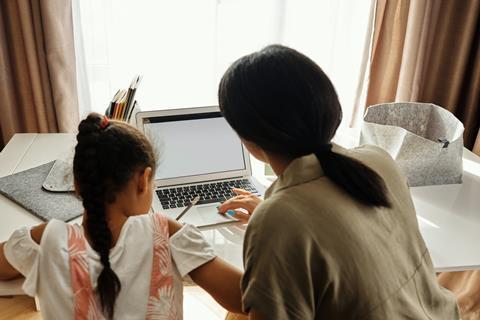
I’ll be honest – this week has been one of mixed, and very intense, emotions. I have a teenager and a tween – the latter had only just started at a new secondary school this academic year. He was quite happy to continue with his home learning – after all, it meant he could finish lessons and be doing his own thing much more quickly! But his teenage sister really struggled online, finding the social isolation difficult, but also anxiety-inducing. Having looked forward to going back, being thrust into a lively, busy environment again has taken its toll on her emotional wellbeing.
For myself, I can recognise how much closer to the edge of my emotions I have been in recent months. Both children are diligent and both their schools have been brilliant at providing live lessons throughout this latest lockdown. And yet, every break (falling at different times for each child) and lunchtime I have been downing tools and interacting with them (I’m a lot better at ‘dining room table ping pong’ now!). There have also been the constant interruptions of “I need to print something and it won’t work!” or “I need to design xxx and don’t know what to do!”. Much more draining, however, has been the emotional support I have needed to provide to my daughter. While I, of course, have been by her side whenever she has needed me, I’ve often felt helpless, frustrated – and very tearful myself. I am hoping (and praying – lots of praying!) that it won’t be long before the usual routines of school provide the stability and social action with peers that both my children need.
For myself, this week I’ve enjoyed having the house to myself for the first time in months and months, but of course I’m missing my kids now!
Revealing statistics
I am certainly not alone. A study from MyTutor reveals some interesting statistics: 54 per cent of parents said that they found home schooling more challenging than working from home, 42 per cent of parents said that their children had to share the working space of themselves or their partners, which of course is less than ideal. So many were juggling their own jobs as well as trying to remember subject material they haven’t used since leaving secondary school themselves! Of those with multiple children of different ages, 48 per cent said they ended up home schooling them altogether, trying to balance multiple curriculums as they did so. Sadly, but not surprisingly, 42 per cent of parents commented that their child has experienced the highest levels of stress they have observed in his/her lifetime.
Ups and downs
For a lot of parents, there were both positives and negatives. For example, Esther has two children, one aged 11 and another aged 13 who is on the autistic spectrum and goes to a special school. She comments: “My life as a home-schooling mum was mixed...I found it exhausting, I realised how little patience I had, but it gave a focus to my day that I never knew I needed; it made me feel worthwhile and gave me a purpose. I miss those moments with my kids...”
Rebecca has one child who is in the last year of primary school and another who is in the first year of his GCSEs. In the first lockdown, her husband was furloughed so was able to spend time helping their daughter. But: “This last lockdown has been really difficult. Both me and my husband have been working and, although I spent time each day with my daughter, we couldn’t always get all of the work done. At times we both had to watch lessons together to understand a concept – long division, frontal adverbials, the science of soil to name but a few – but we also laughed a lot together.
“‘If Amir has 50 stickers and Sara has 100 stickers, but Amy has 15 per cent more of them both – how many does Amy have’?
Answer – clearly too many and she needs to get another hobby....
“Our son spent most of the last year in his room, managing his own timetable and work load. We tried to check regularly how he was doing, but in all honesty we don’t know fully know and will await his assessments from school over the next couple of months to see where he is educationally and where he may have fallen behind.
“We anticipate a summer of catching up and revision but, in truth, I’ve loved having both children around so much at home.”
Making the switch permanently
In the survey, 44 per cent of parents felt that home tutoring does not come easily to them, but was the most fulfilling task they’ve ever completed. Kemi and her husband have two teenage children and run a business from their home. Their youngest daughter had been finding the transition to secondary school difficult: “She was anxious and exhausted and not really taking anything in. Her cousins in New Zealand are home educated so she was inspired by that.”
After the first lockdown, they decided to take “her off the assignments set by her school, and began to build her studies around things she was interested in. It made such a difference to her wellbeing and confidence that we decided to stick with it. This Easter we will be one year into our home education journey. I’m not sure we would have jumped ship without lockdown. Interestingly, our local authority told us that de-registration has gone up by over 200 per cent this year – so quite a few others have done the same.”
Remaining aware
Parents, children and teachers are to be applauded for continuing to engage with education with such determination. As we settle back into whatever routines we have chosen, may we remember that this period has affected each of us in different ways. Care, consideration and compassion is needed across the board as we move forward.
Photo by August de Richelieu from Pexels




































